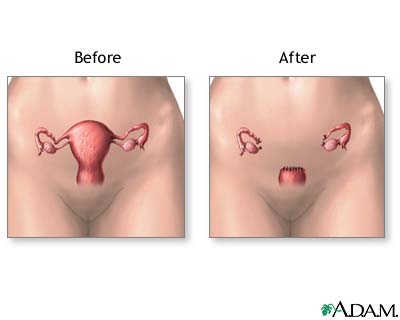 A hysterectomy is medically necessary for many women in the treatment
of uterine fibroids, cancer, abnormal bleeding and endometriosis. This
procedure significantly impacts a woman’s physical and emotional
well-being. It has long been associated with negative side effects,
including hormonal imbalances and deterioration of sex drive, leading
many women to refuse the procedure and live with excruciating pain. But,
studies have shown that women do not have to fear a hysterectomy; in
fact, many experience an improvement in their sex lives.
A hysterectomy is medically necessary for many women in the treatment
of uterine fibroids, cancer, abnormal bleeding and endometriosis. This
procedure significantly impacts a woman’s physical and emotional
well-being. It has long been associated with negative side effects,
including hormonal imbalances and deterioration of sex drive, leading
many women to refuse the procedure and live with excruciating pain. But,
studies have shown that women do not have to fear a hysterectomy; in
fact, many experience an improvement in their sex lives. A 1999 study, published in the Journal of the American Medical
Association, tracked the sexual function of more than 1,000 women
between the ages of 35 and 49 who had had a hysterectomy. Ninety percent
of the subjects had not yet entered menopause during the course of the
study. The women were followed for two years after the procedure and
the outcomes surprised researchers. According to the researchers at the
University of Maryland Medical Center, where the study was conducted:
A 1999 study, published in the Journal of the American Medical
Association, tracked the sexual function of more than 1,000 women
between the ages of 35 and 49 who had had a hysterectomy. Ninety percent
of the subjects had not yet entered menopause during the course of the
study. The women were followed for two years after the procedure and
the outcomes surprised researchers. According to the researchers at the
University of Maryland Medical Center, where the study was conducted:• Sexual activity increased after hysterectomy
The number of women having sexual relations at least five times a month increased by 10 percent.
• Orgasm frequency increased
After surgery, 72 percent said they were experiencing orgasms, compared to 63 percent before the surgery.

• Orgasm strength improved
The number of women who said they had strong orgasms increased from 45 percent before the hysterectomy to 57 percent after surgery.
• Women experienced less pain during sex
The proportion of women experiencing pain during sex dropped dramatically, from 40 percent before hysterectomy to 15 percent two years later.
The lead researcher of the study was quick to point out that some of the subjects experienced a negative impact on their sexual health, but the vast majority saw improvements. One reported side effect is reduced orgasms, which some link to loss of the cervix. However, no research has proven that loss of the cervix affects stimulation. There is speculation that vaginal orgasms may be hampered, while orgasms from clitoral stimulation are not likely to be affected.
These results are not an endorsement of a hysterectomy as a sort of sex therapy. In fact, women should only consider a hysterectomy when all other options have been exhausted. Each year, 600,000 women undergo a hysterectomy and at least 10 to 15 percent of the procedures are unnecessary.
In some cases, women can avoid a hysterectomy through hormone therapy or banish the negative side effects if the surgery is not optional. An imbalance of estrogen, progesterone and even testosterone can lead to sexual impairment and other symptoms similar to those reported by menopausal women. These symptoms may be remedied safely and effectively through a comprehensive hormone therapy treatment plan for a specially trained physician.

A 2012 study uncovered evidence that a combination of bioidentical progesterone with bioidentical estrogen therapy provides the greatest improvements in sexual function for women experiencing symptoms of menopause, including increased lubrication, desire, arousal, orgasm and decreased pain during intercourse. And the best news is that hysterectomy patients tend to have the greatest responses to hormone therapy treatment
Dr. Jennifer Landa is Chief Medical Officer of BodyLogicMD
 ,
the nation's largest franchise of physicians specializing in
bioidentical hormone therapy. Dr. Jen spent 10 years as a traditional
OB-GYN, and then became board-certified in regenerative medicine, with
an emphasis on bio-identical hormones, preventative medicine and
nutrition. She is the author of "The Sex Drive Solution for Women."
,
the nation's largest franchise of physicians specializing in
bioidentical hormone therapy. Dr. Jen spent 10 years as a traditional
OB-GYN, and then became board-certified in regenerative medicine, with
an emphasis on bio-identical hormones, preventative medicine and
nutrition. She is the author of "The Sex Drive Solution for Women."